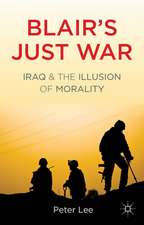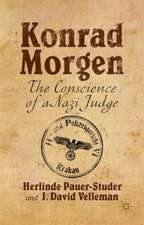Balkan Legacies of the Great War: St Antony's Series
Editat de Othon Anastasakis, David Madden, Elizabeth Robertsen Limba Engleză Hardback – 15 dec 2015
The contributions in this volume significantly enhance the debate about how the Great War is remembered in South East Europe, and why it still evokes such strong emotions and reactions, more than a century after its beginnings.
Din seria St Antony's Series
-
 Preț: 381.98 lei
Preț: 381.98 lei - 18%
 Preț: 895.27 lei
Preț: 895.27 lei -
 Preț: 304.38 lei
Preț: 304.38 lei - 18%
 Preț: 891.33 lei
Preț: 891.33 lei - 15%
 Preț: 647.27 lei
Preț: 647.27 lei - 20%
 Preț: 939.86 lei
Preț: 939.86 lei - 18%
 Preț: 687.06 lei
Preț: 687.06 lei -
 Preț: 263.28 lei
Preț: 263.28 lei - 15%
 Preț: 640.37 lei
Preț: 640.37 lei - 15%
 Preț: 644.63 lei
Preț: 644.63 lei -
 Preț: 391.22 lei
Preț: 391.22 lei - 15%
 Preț: 644.18 lei
Preț: 644.18 lei - 15%
 Preț: 646.62 lei
Preț: 646.62 lei -
 Preț: 338.31 lei
Preț: 338.31 lei - 15%
 Preț: 643.34 lei
Preț: 643.34 lei - 15%
 Preț: 643.48 lei
Preț: 643.48 lei - 15%
 Preț: 640.55 lei
Preț: 640.55 lei -
 Preț: 389.11 lei
Preț: 389.11 lei - 15%
 Preț: 641.20 lei
Preț: 641.20 lei - 15%
 Preț: 639.08 lei
Preț: 639.08 lei - 15%
 Preț: 640.71 lei
Preț: 640.71 lei - 18%
 Preț: 1384.88 lei
Preț: 1384.88 lei - 15%
 Preț: 641.85 lei
Preț: 641.85 lei - 15%
 Preț: 641.53 lei
Preț: 641.53 lei - 15%
 Preț: 642.51 lei
Preț: 642.51 lei - 15%
 Preț: 642.83 lei
Preț: 642.83 lei - 15%
 Preț: 643.99 lei
Preț: 643.99 lei - 15%
 Preț: 647.27 lei
Preț: 647.27 lei -
 Preț: 390.08 lei
Preț: 390.08 lei - 18%
 Preț: 783.50 lei
Preț: 783.50 lei - 15%
 Preț: 641.03 lei
Preț: 641.03 lei - 18%
 Preț: 943.88 lei
Preț: 943.88 lei - 15%
 Preț: 641.85 lei
Preț: 641.85 lei - 15%
 Preț: 641.38 lei
Preț: 641.38 lei -
 Preț: 385.47 lei
Preț: 385.47 lei -
 Preț: 338.31 lei
Preț: 338.31 lei -
 Preț: 389.31 lei
Preț: 389.31 lei - 15%
 Preț: 641.03 lei
Preț: 641.03 lei - 18%
 Preț: 727.00 lei
Preț: 727.00 lei - 15%
 Preț: 640.88 lei
Preț: 640.88 lei -
 Preț: 448.82 lei
Preț: 448.82 lei - 18%
 Preț: 946.24 lei
Preț: 946.24 lei -
 Preț: 389.88 lei
Preț: 389.88 lei - 15%
 Preț: 643.00 lei
Preț: 643.00 lei - 15%
 Preț: 639.25 lei
Preț: 639.25 lei - 18%
 Preț: 948.61 lei
Preț: 948.61 lei - 15%
 Preț: 643.00 lei
Preț: 643.00 lei -
 Preț: 393.13 lei
Preț: 393.13 lei
Preț: 415.39 lei
Nou
Puncte Express: 623
Preț estimativ în valută:
79.49€ • 82.13$ • 66.12£
79.49€ • 82.13$ • 66.12£
Carte tipărită la comandă
Livrare economică 19 martie-02 aprilie
Preluare comenzi: 021 569.72.76
Specificații
ISBN-13: 9781137564139
ISBN-10: 113756413X
Pagini: 96
Ilustrații: XIV, 90 p.
Dimensiuni: 140 x 216 x 10 mm
Greutate: 0.28 kg
Ediția:1st ed. 2015
Editura: Palgrave Macmillan UK
Colecția Palgrave Macmillan
Seria St Antony's Series
Locul publicării:London, United Kingdom
ISBN-10: 113756413X
Pagini: 96
Ilustrații: XIV, 90 p.
Dimensiuni: 140 x 216 x 10 mm
Greutate: 0.28 kg
Ediția:1st ed. 2015
Editura: Palgrave Macmillan UK
Colecția Palgrave Macmillan
Seria St Antony's Series
Locul publicării:London, United Kingdom
Cuprins
1. Introduction: The Past Is Never Dead; Othon Anastasakis, David Madden and Elizabeth Roberts
2. Too Much History and Too Many Neighbours: Europe and The Balkans Before 1914; Margaret MacMillan
3. The Black Hand and the Sarajevo Conspiracy; Ivor Roberts
4. The Contrasting Legacies of the South Slav Question; Ivo Banac
5. Was The First World War the Turning Point at which Bulgarian History Failed to Turn?; Richard Crampton
6. World War I and The Fall Of The Ottomans: Consequences for South East Europe; Eugene Rogan
7. Unwanted Legacies: Greece and the Great War; Basil C. Gounaris
Epilogue: It Is Not Even Past! Othon Anastasakis, David Madden, and Elizabeth Roberts
2. Too Much History and Too Many Neighbours: Europe and The Balkans Before 1914; Margaret MacMillan
3. The Black Hand and the Sarajevo Conspiracy; Ivor Roberts
4. The Contrasting Legacies of the South Slav Question; Ivo Banac
5. Was The First World War the Turning Point at which Bulgarian History Failed to Turn?; Richard Crampton
6. World War I and The Fall Of The Ottomans: Consequences for South East Europe; Eugene Rogan
7. Unwanted Legacies: Greece and the Great War; Basil C. Gounaris
Epilogue: It Is Not Even Past! Othon Anastasakis, David Madden, and Elizabeth Roberts
Recenzii
"While there is a growing body of work on the global consequences of the First World War, little attention has been paid to the war's legacy in the Balkans, where the conflict began. In this fascinating book, experts on the region explore the impact of war on the politics and memory cultures of the states of the Balkan peninsula and identify unresolved questions that retain the potential to stir conflict today. Essential reading for anyone interested in the long afterlife of the First World War." - Sir Christopher Clark, Regis Professor of History, University of Cambridge, UK
Notă biografică
Othon Anastasakis is Director of South East European Studies and Director of the European Studies Centre, St Antony's College (2012-2015), and Senior Research Fellow at the Department of Politics and International Relations, University of Oxford, UK. He has published books and articles on the politics, history and political economy of South East Europe and its relations with the European Union.
David Madden is a former Ambassador and Senior Member of St Antony's College, University of Oxford, UK. He has extensive experience of working in places on the brink of break-up (Yugoslavia in the 1980s), those divided (Berlin in the 1970s, Cyprus, Bosnia and Herzegovina), and those where there are regional tensions.
Elizabeth Roberts is a former Australian diplomat and has, after living in the former Yugoslavia for four years, become a Balkan scholar over the last twenty years, lecturing and publishing a number of articles and two books, Realm of the Black Mountain: A History of Montenegro (2007) and The Sandzak: A History (co-authored with Kenneth Morrison), in 2013.
David Madden is a former Ambassador and Senior Member of St Antony's College, University of Oxford, UK. He has extensive experience of working in places on the brink of break-up (Yugoslavia in the 1980s), those divided (Berlin in the 1970s, Cyprus, Bosnia and Herzegovina), and those where there are regional tensions.
Elizabeth Roberts is a former Australian diplomat and has, after living in the former Yugoslavia for four years, become a Balkan scholar over the last twenty years, lecturing and publishing a number of articles and two books, Realm of the Black Mountain: A History of Montenegro (2007) and The Sandzak: A History (co-authored with Kenneth Morrison), in 2013.
Textul de pe ultima copertă
This is a rich yet succinct account of an underexplored story: the consequences of the Great War for the region which ignited it. It offers a fascinating tapestry: the collapse of Empires, the birth of Turkey and Yugoslavia, Greece as both victor and loser, Bulgaria's humiliating defeat; bitter memories, forced migrations, territorial implications and collective national amnesias. The legacies live on.
The contributions in this volume significantly enhance the debate about how the Great War is remembered in South East Europe, and why it still evokes such strong emotions and reactions, more than a century after its beginnings.
The contributions in this volume significantly enhance the debate about how the Great War is remembered in South East Europe, and why it still evokes such strong emotions and reactions, more than a century after its beginnings.














